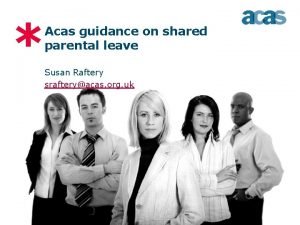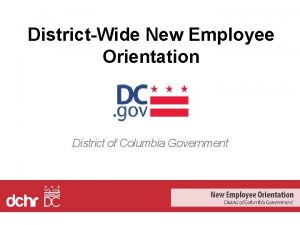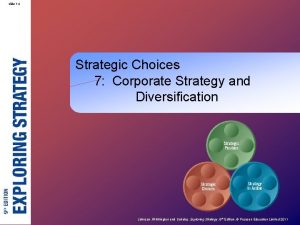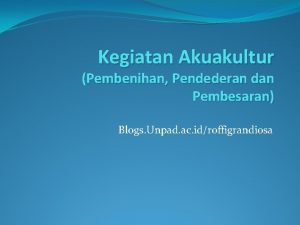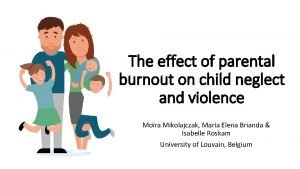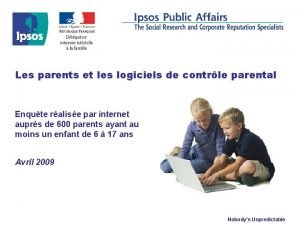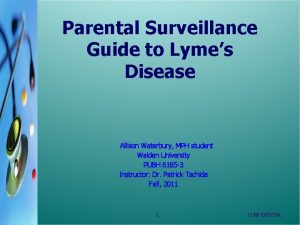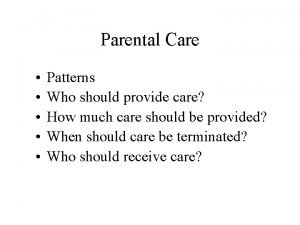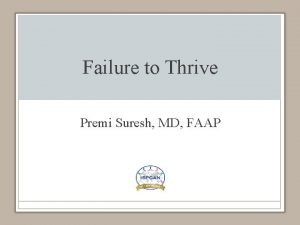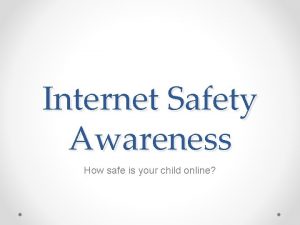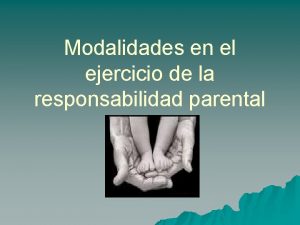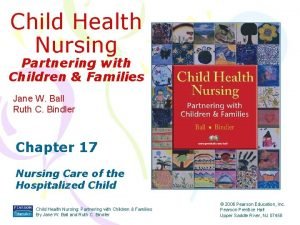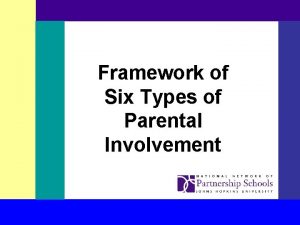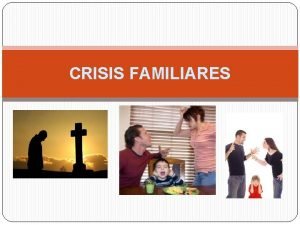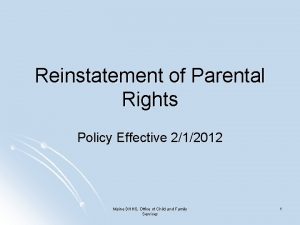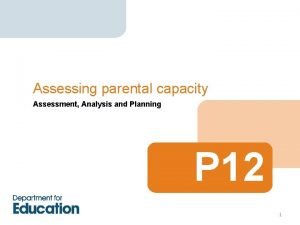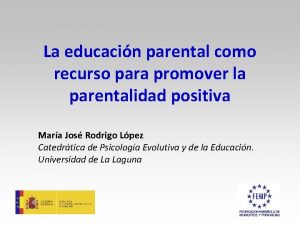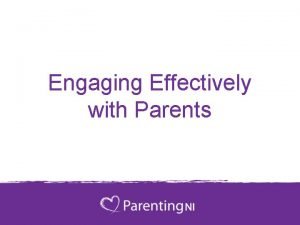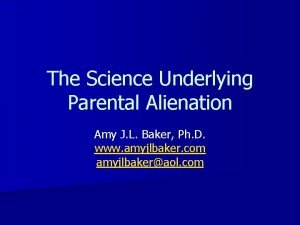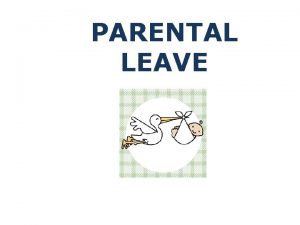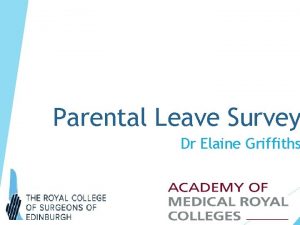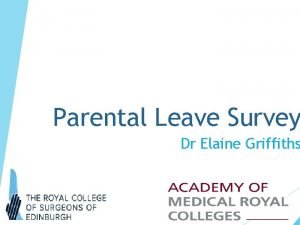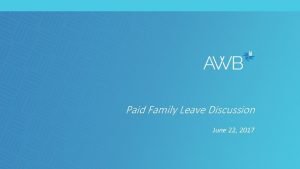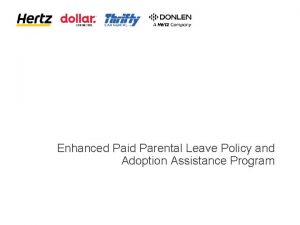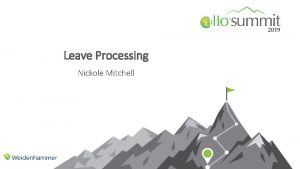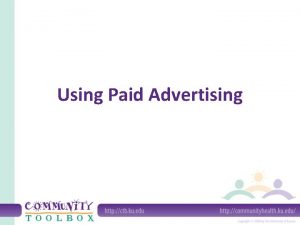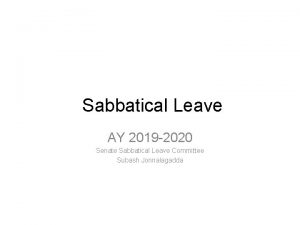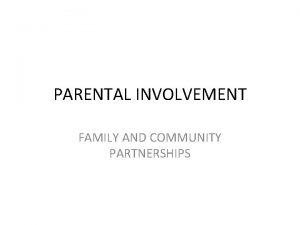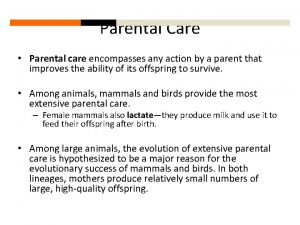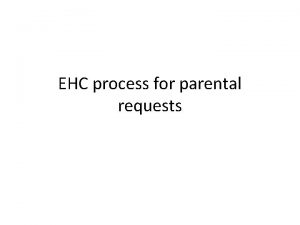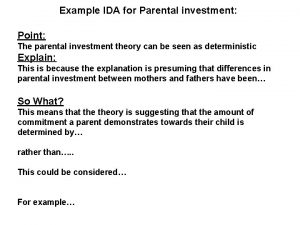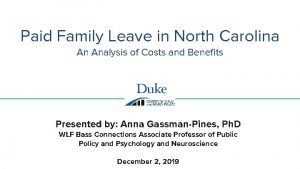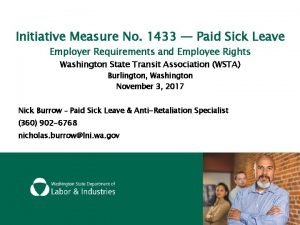April 23 2019 Evaluation of Paid Parental Leave









































- Slides: 41

+ April 23, 2019 Evaluation of Paid Parental Leave in Multnomah County, OR Julia Goodman, Ph. D Dawn Richardson, Dr. PH David Hurtado, Sc. D

+ What We Know Paid Leave Matters n Enables workers to combine work and caregiving without risking financial hardship n Linked to lower infant and child mortality, longer duration of breastfeeding, improved maternal mental health, and higher quality of mother-infant interactions and attachment security n Linked to increased employee retention and gender equality in the workforce

+ What We DON’T Know How, Why & in What Ways Does Paid Leave Matter n How does the adoption of a new policy impact leave-taking? Do employees use the benefit, and how? n How do employees navigate the leave-taking process? What are their experiences? n What lessons can we learn from adoption & implementation of new policies?

+ Our Partnership Multnomah County OHSU-PSU School of Public Health November 2015 Paid Parental Leave Spring 2019 Presentation to County Commissioners Summer-Fall 2017 Data Collection Spring 2016 OHSU-PSU SPH approached Mult. Co about research ideas Fall 2018 Written report submitted to Mult. Co Fall 2017 -Fall 2018 Data Analysis & Report Writing

+ Our Study Design SURVEY OF COUNTY EMPLOYEES • • Summer 2017 659 employees, 163 added child since 2014 A Mixed-Methods Approach FOCUS GROUPS REVIEW OF ADMINISTRATIVE DATA • • Leave-taking both before and after implementation of Paid Parental Leave 579 people who added child between Jan. 1, 2013 and Dec. 21, 2017 Quantitative • Fall 2017 • Five groups of people having added child • Two for people who did not add a child • 35 employees total Qualitative

+ Our Research Questions 1. How does the adoption of Multnomah County’s new paid leave policy impact employee leavetaking behavior? 2. How do Multnomah County employees experience the new paid leave policy and navigate the leavetaking experience? 3. What lessons can we learn from Multnomah County’s adoption and implementation of the paid leave policy?

+ Employee Leave-Taking: Knowledge & Behavior

+ Employee Knowledge of PPL n Most employees (64%) reported they were “moderately” or “very familiar” with the policy n Fewer people were aware that the policy covers foster parents (74% compared to 96% for biological children) n Employees most commonly learned about the policy through employee policies/personnel rules, “Wednesday Wire, ” and their Co-workers Survey Findings

+ Employee Knowledge of PPL (2) My employer helped me understand what benefits I was eligible for 74% My employer communicated clearly about my parental leave benefits 75% 9% 18% 6% 20% My employer responded to my questions in a timely manner 86% 5%9% My employer responded to my questions in a friendly way 86% 4% 10% My employer clearly explained my eligibility for parental leave Agree 73% Neither agree /disagree 7% 20% Disagree Survey Findings

+ Employee Knowledge of PPL (3) I really lucked out because the policy went into place 4 days before my son was born. When the email came out I either thought it was one of my coworkers playing a joke on me, or in 2020 we are going to do this maybe. I started calling people because a lot of my peers were having children at the same time. The difference it made -- we are first-time parents. We had no idea what the heck we were doing. I also had some fear, I had only worked for the county for 11 months, so going to your boss at 11 months, or leading up to that and saying, Hey, I need to take a bunch of time off was scary. My boss actually was, “You realize, this isn't about my permission. These are your rights as an employee. You are entitled to this. “And she was very supportive, even to the point where she was, “We can have you growing and developing with your kids, or at work thinking about doing that all the time. It is important to get the best for your family. “ Focus Group Findings

+ Employee Knowledge of PPL (4) HR has so many strict rules about—you can't get paid parental leave until the baby is actually born, but then I had to take off two weeks before, so I had to use vacation, and then they needed to know the exact date he was born so the paid parental could kick in, and I didn't know when exactly, when vacation ran out. Focus Group Findings

+ Employee Knowledge of PPL (5) I think with FMLA and OFLA and some of the programs, that if you don't know what questions to ask, you don't get the answer you need. I think it is really easy for folks to miss out on leave or that kind of stuff because I didn't ask the right question. What is hard is if you don't know what the right question is, then how do you ask it. I think I am finding that, even when I do thing with folks around leave or just to plan around too much sick leave or whatever that could have been protected, but they didn't ask the right question or they didn't know who to ask. I think that is also really challenging. A lot of these leaves are hard to understand therefore hard to use. Focus Group Findings

+ Employee Leave Taking Behavior (1) Overall, leave increased by about a week n Lot of individual variation n n Paid leave increased by 2. 5 weeks, on average Men and women responded differently Change in leave in 3 months after adding dependent 150 131, 32 100 Hours n 50 37, 5145, 28 35, 64 0 Women Men -6, 36 -50 -78, 65 -100 Total Leave Paid Leave Unpaid Leave Admin Findings

+ Employee Leave Taking Behavior (2) Difference by gender, race/ethnicity, & managerial status n Hispanic employees had the highest total number of leave hours and the highest amount of unpaid hours n Black employees had fewest number of all leave types (total, paid, and unpaid) n Managers took more paid leave hours, but fewer unpaid leave hours, than non-managers (total hours about the same) Admin Findings

+ Employee Leave Taking Behavior (3) Employees identities may impact leave-taking behavior n n Fear of losing job as reason for return: n Non-Hispanic Whites = 8% n All other racial and ethnic identities= 33. 3% Financial concerns: n Non-Hispanic Whites = 51% n All other racial and ethnic identities= 62. 5% Survey Findings

+ Key Points (1) n Employees are generally familiar with the policy but experience some confusion around how to combine their PPL-supported time w/other time (vacation, sick, etc. ) n Adoption of the policy has supported additional leave taking n Leave-taking patterns differ by gender, race/ethnicity, and managerial status (reflecting the literature on paid leave usage)

+ Employee Leave-Taking: Navigation & Experiences

+ Impacts on Health & Wellbeing (1) Theme: Benefits of PPL I went to every prenatal appointment, because my wife also lost a baby before. I attended every doctor's appointment and I still to this day have attended every doctor's appointment. And if I had burned up everything, I wouldn’t have been able to participate like that. It really made a big difference for me… …It was really great. It wasn't something I expected. It is that kind of tug. Like you were talking about, it is not Europe but it seems so glorious for us to even have the prospect. Do I think it should be more? Probably, but it was awesome to have the time that I did. Focus Group Findings

+ Impacts on Health & Wellbeing (2) Theme: Benefits of PPL [The paid parental leave policy] is a benefit. It could be better, but it is still nice to have, just for, health-wise. Anything could happen. C-sections take forever to heal. If you have to have one, at least you can lay up at home and take care of your child. So, yeah, I think it is a combination of good for your mental state and your body and your health and the health of your child as well. In my case, finances are incredibly, incredibly tight. My husband, he is only doing part-time work right now, so I’m pretty much the breadwinner, so all of these things could totally, totally stress me out, but at least that one thing is good to go. Focus Group Findings

+ Impacts on Health & Wellbeing (3) Theme: Benefits of PPL …Breastfeeding was hellish for me. If I had to go back, even after six weeks, I don't think it would have lasted. I had that, what, 13 or 14 weeks, and it still barely lasted. And in hindsight, if I ever have another baby, I never realized how many doctor's appointments there were in that first month or two for yourself and for the baby. It was like a full-time job, driving to doctor's offices. And you just need that time to focus on yourself and figure that out. You’re not sleeping except for random times during the day. How would you work if you can only nap when the baby naps? You need that time. I experienced—I don't know if you guys had any sort of post partum depression or baby blues or anything like that, but that really wrecks you. I had a little bit of that. So I needed as much time as possible. I would have jumped off a cliff or something if I had to go back to work. Focus Group Findings

+ Impacts on Health & Wellbeing (4) n Many people said they did not breastfeed for as long as intended, often because of a work-related challenge or barrier n Supervisor support enables employees to breastfeed as long as they intended 82% of people who said their supervisor was “somewhat supportive” did not breastfeed as long as intended n 39% of people who said their supervisor was “very supportive” did not breastfeed as long as intended n Survey Findings

+ Role of Supervisors (1) n Supervisors played a major role in how employees FELT about leave taking, but not necessary whether they TOOK leave n Supervisor support led to feelings of n Enhanced trust n Feelings of empathy for supervisor/coworkers n Earlier planning of leave taking n Enhanced productivity before and after leave taking n Enhanced sense of collegiality with coworkers n Allegiance to/commitment to employer n Strengthened intentions to return to work Focus Group Findings

+ Role of Supervisors (2) Theme: Role of Supervisor There is an entity of the county…there are some units that are way out there…and there are some units that are trailing way behind…. Going back to PPL, is an attempt by leadership of the county to kind of move the whole thing in the family friendly direction. It is true that depending on what department you work on, what unit you work in, who your supervisor is, even in departments…that tend to be very family friendly, it is still even there down to your direct supervisor for a lot of frontline staff. Focus Group Findings

+ Key Points (2) n Employees are experiencing positive impacts on self-reported health & well-being due to the policy n Employees are enthusiastic about the benefits they experience due to adoption of the policy n Inequities across employees are related to differing levels of expressed and instrumental supervisor support

+ Lessons Learned from Adoption & Implementation

+ Recruitment & Retention (1) n 72% of all respondents said it was “Very Important” or “Essential” to work for an employer that offers paid parental leave. n Percent of people saying employer offering PPL is “essential” n n Women: 39% Employees of Color: 50% Employees under 30: 59% Employees 31 -34: 49% Survey Findings

+ Recruitment & Retention (2) Male Not at all important Important Essential Total 36. 1% 39. 3% 5. 3% 150 NHW Not at all important Important Essential Total 43. 7% 48. 2% 8. 1% 455 < 30 26. 8% 56. 1% 17. 1% 41 30 -34 21. 5% 61. 6% 16. 8% 107 Gender Female 33. 3% 52. 1% 11. 7% 417 Race Non. NHW 31. 9% 51. 3% 16. 8% 119 Age (yrs) 35 -39 35. 6% 54. 0% 10. 4% 135 Others 0. 0% 55. 5% 11. 1% 18 When you were considering applying for a job with Multnomah County, how important were family leave policies in your decision? Decline to state 33. 3% 18 40 -44 50. 0% 39. 8% 10. 2% 98 > 45 55. 1% 40. 1% 4. 8% 207 Survey Findings

+ Recruitment & Retention (3) Male 28. 0% 53. 3% 18. 7% 150 Not at all important Important Essential Total NHW Not at all important Important Essential Total 25. 5% 51. 7% 22. 9% 454 < 30 4. 9% 56. 1% 39. 0% 41 30 -34 6. 5% 51. 0% 42. 6% 108 Gender Female 21. 6% 48. 7% 29. 7% 417 Race Non. NHW 14. 4% 46. 6% 39. 0% 119 Age (yrs) 35 -39 13. 4% 59. 0% 27. 6% 134 Others 16. 7% 50. 0% 33. 3% 18 How important are family leave policies like parental leave in retaining you in your current job? Decline to state 16. 7% 33. 3% 50. 0% 18 40 -44 27. 6% 45. 9% 26. 5% 98 > 45 41. 3% 44. 1% 14. 6% 206 Survey Findings

+ Recruitment & Retention (4) Theme: Importance of Paid Leave “I did not take a job with the state because they don’t have paternity leave. I very recently applied for, interviewed for, and withdrew my name for consideration for a job with the state, because I want to have another kid. No paternity leave? Screw that. ” Focus Group Findings

+ Recruitment & Retention (5) Theme: Importance of Paid Leave …I am only applying for Multnomah County and City of Portland because those are the only two government agencies at this time that offer paid parental leave. Focus Group Findings

+ Recruitment & Retention (6) Theme: Importance of Paid Leave I actually, with my son, I had him, and right after this paid parental leave came out. A couple supervisors approached and said, “Hey, have you looked into that because I think you have the opportunity to take advantage of that time off in the first year of your child's life. ” So I did. My son was 11 months old and I was able to take 4 weeks off later, which was fantastic and much needed…. I feel valued by the County, that they value their employees enough to implement a policy like this. It isn't a ton of time. This isn't Europe, but 6 weeks is huge…because my family needs continuous income. I feel like it is a great policy. I am happy that the County values their employees enough to put that in place. Focus Group Findings

+ Beyond PPL (1) n n n Six weeks very appreciated but seen as “not enough” 23% of survey respondents were caring for an adult; 13% were caring for an adult and a child Employees requested paid leave to care for loved ones who are not children I am not going to have kids, and I also would like six weeks of paid leave for stuff. I do have sick parents, and so… it feels like a little bit of a morale killer in an interesting way. I feel great about working at the County… But I feel in this one instance, it would be nice to figure out how we could extend a similar benefit to everyone. Survey Findings

+ Beyond PPL (2) n Other “asks” included: n More flexible work schedules n Option to work from home n Availability of paid or low-cost childcare n More workplace lactation support Survey Findings

+ Workplace Culture If you are in a tiny unit, as I was moved to a tiny unit for each of my pregnancies, then they’re just SOL. People will resent you and so there is a pressure to maybe take less leave or be apologetic about it, or do whatever because now you feel like you are indebted to other people because you have decided to have a child and do what you are legally entitled to do. Focus Group Findings

+ Key Points (3) n Employees are grateful to the County for adoption of paid leave; for some employees, this benefit was a determining factor in why they work (or continue to work) for the County n Employees made suggestions for how the benefit could be extended, in particular for caring for other family members n Workplace culture (combined with supervisor support) may impact how employees experience leave-taking, particularly across a diverse workforce

+ Recommendations and Next Steps

+ Recommendations (1) Supervisor Trainings n How different leave-taking policies fit together n How to have respectful and transparent conversations with employees in the early stages of planning for leave taking n How to create comfortable work environments for breastfeeding and pumping n How to be more supportive of employees taking leave in general

+ Recommendations (2) n Continue focus on the supervisor n n n Align w/Safety, Trust, Belonging, and Workforce Equity efforts Specific supervisor education: n FMLA/OFLA/PPL n Creating a culture that is supportive of leave-taking and lactation support n Expectations of County for supervisors, re: leave-taking Consideration of other family-friendly policies n Reiterating flexible schedules and work from home n Research and/or cost analysis of paid leave for care of non-child dependents

+ Disseminating Study Findings OHSU-PSU SPH Efforts n Conference presentations n Publication of manuscripts n Efforts to obtain additional funding to extend study Multnomah County Efforts (Potential) n Communicate PPL Benefits & Expectations n E-learning highlighting: n Benefits of PPL n Role of the supervisor n Expectations of County for supervisors, re: leave-taking

+ Thank You

+ Acknowledgements n Multnomah County Partners n n n Project Support n n Anna Plumb, MPP – Multnomah County Department of County Management Kristin Wray – Multnomah County Benefits Office Tami Mahrt – Multnomah County Benefits Office Travis Graves, SPHR, IPMA-CP, SHRM-SCP – Multnomah County Human Resources Director Lisset Dumet Poma, MBA Oregon Institute of Occupational Health Sciences, OHSU Anna Steeves-Reece, MPH, MA OHSU-PSU School of Public Health Allea Martin, MPH Qualitative Research Consultant Partial Funding n OHSU-PSU School of Public Health Pilot Award
 Acas shared parental leave
Acas shared parental leave Dchr holidays
Dchr holidays Dynamic approach to personality
Dynamic approach to personality Horizontal
Horizontal Pedigree chart symbols
Pedigree chart symbols Kohut biografia
Kohut biografia Portfolio manager synergy manager parental developer
Portfolio manager synergy manager parental developer Use of large volume parenterals
Use of large volume parenterals Parental care pada ikan
Parental care pada ikan What does burnout feel like
What does burnout feel like Ciclo vital individual
Ciclo vital individual Parental alienation lawyer logan county
Parental alienation lawyer logan county Contrle parental
Contrle parental Synagro waterbury ct
Synagro waterbury ct Parental
Parental Contrle parental software
Contrle parental software What is terfa
What is terfa Contrle parental software
Contrle parental software Ftt
Ftt Bt parental pin
Bt parental pin Parental investment theory
Parental investment theory Recombinant vs parental
Recombinant vs parental Parental phenotype
Parental phenotype Ejercicio de la responsabilidad parental
Ejercicio de la responsabilidad parental Joan kloth-zanard
Joan kloth-zanard Parental fluid
Parental fluid Parental vs recombinant
Parental vs recombinant Parental rights over child's health
Parental rights over child's health Six types of parental involvement
Six types of parental involvement Parental dna
Parental dna Tipos de crisis familiares normativas
Tipos de crisis familiares normativas Termination of parental rights maine
Termination of parental rights maine Parental phenotype
Parental phenotype Phrynixalus biroi
Phrynixalus biroi Parental capacity example
Parental capacity example Parental dna
Parental dna Parental melt
Parental melt Programas de educación parental
Programas de educación parental Alimentos derivados de la responsabilidad parental
Alimentos derivados de la responsabilidad parental Contrle parental program
Contrle parental program Amy baker parental alienation
Amy baker parental alienation Sordaria sp
Sordaria sp
